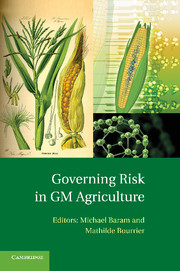Book contents
- Frontmatter
- Contents
- Preface
- Contributors
- 1 Governing Risk in GM Agriculture
- Part I Risk Governance and Public Discourse
- 2 Governance of GM Crop and Food Safety in the United States
- 3 The European Union's Regulatory Framework
- 4 The Dutch Approach to Safety Governance of GM Agriculture
- 5 Evolution of the Regulatory System for GM Crops in Brazil
- Part II Future Challenges
- Index
- References
5 - Evolution of the Regulatory System for GM Crops in Brazil
Published online by Cambridge University Press: 01 March 2011
- Frontmatter
- Contents
- Preface
- Contributors
- 1 Governing Risk in GM Agriculture
- Part I Risk Governance and Public Discourse
- 2 Governance of GM Crop and Food Safety in the United States
- 3 The European Union's Regulatory Framework
- 4 The Dutch Approach to Safety Governance of GM Agriculture
- 5 Evolution of the Regulatory System for GM Crops in Brazil
- Part II Future Challenges
- Index
- References
Summary
Introduction
No one will deny that scientific research also has risks and engenders dangers. Decisions have to be taken on research projects without knowing in advance what the results will be (if it were otherwise there would be no point in starting). The dangers of such an enterprise are also obvious. They arise from the circumstance that in modern society knowledge, once it has found its way into the world, can be neither kept secret nor ignored by other function systems as soon as it becomes relevant in their context. This is particularly true for the economy because of the pressure of competition. It also holds for the political system in the military field, and for the whole area of intervention and protection policy. (…) Finally, there are risks inherent in scientific research itself, where, for example nuclear energy is in play or genetic engineering experiments are carried out.
Niklas LuhmanCommercial cultivation of genetically modified (GM) crops has advanced in developing countries and is now widespread. The largest increase among developing nations has occurred in Brazil, where, until recently, national policies had restricted GM agriculture. However, since enactment of a new law in 2005 setting forth procedures for approving the planting and sale of GM crops, Brazil has become the leading exporter of GM soybeans, has GM crops growing on 9.4 million hectares, and now produces an estimated 10 percent of global GM crops, at last count.
- Type
- Chapter
- Information
- Governing Risk in GM Agriculture , pp. 113 - 136Publisher: Cambridge University PressPrint publication year: 2010



